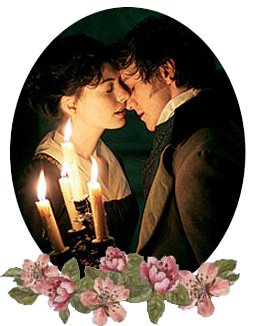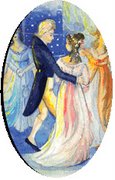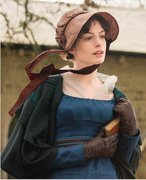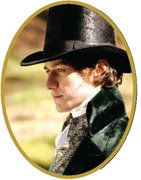Jane Austen Quote - Week 48 by Linda
 This week we shall endeavor to discern what Jane Austen really thought about ‘novels’ as described in Northanger Abbey.
This week we shall endeavor to discern what Jane Austen really thought about ‘novels’ as described in Northanger Abbey.
In chapter 1 she tells how Catherine preferred other pursuits
“…. to books — or at least books of information — for, provided that nothing like useful knowledge could be gained from them, provided they were all story and no reflection, she had never any objection to books at all.”
If we take the opposite view, that we should prefer, or that novels should be, ‘books of information’ with useful knowledge and reflection, we now have a description of what to look for in novels.
With that in mind, let’s continue from last week’s paragraph in Chapter 5 which should be read in its entirety, from which we shall distill only a few gems.
Jane is lamenting the fact, through Catherine’s ‘voice’, that other novelists write very degrading thoughts about novels. However, Jane goes on to say:
And while the abilities of the nine–hundredth abridger of the History of England, or of the man who collects and publishes in a volume some dozen lines of Milton, Pope, and Prior, with a paper from the Spectator, and a chapter from Sterne, are eulogized by a thousand pens — there seems almost a general wish of decrying the capacity and undervaluing the labour of the novelist, and of slighting the performances which have only genius, wit, and taste to recommend them.
Though I was a bit familiar with the others, I had to do a search to find out who Prior was. Now here is the key to ‘novels’ – they must “have only genius, wit, and taste to recommend them”. And that, my friends, is what Jane put in hers.
In addition, Jane says this:
“It is only Cecilia, or Camilla, or Belinda”; or, in short, only some work in which the greatest powers of the mind are displayed, in which the most thorough knowledge of human nature, the happiest delineation of its varieties, the liveliest effusions of wit and humour, are conveyed to the world in the best–chosen language.
That is Jane’s description of those novels. Then she sarcastically says about the periodical, “The Spectator”:
the substance of its papers so often consisting in the statement of improbable circumstances, unnatural characters, and topics of conversation which no longer concern anyone living; and their language, too, frequently so coarse as to give no very favourable idea of the age that could endure it.
I say ‘sarcastically’ because the opposite is true. It does have probable circumstances, natural characters, timeless topics of conversation and pertinent language.
Now, let’s put all that together and here is what we have. A novel should be books of information with useful knowledge and reflection, with only genius, wit, and taste to recommend them, in which the greatest powers of the mind are displayed, the most thorough knowledge of human nature, the happiest delineation of its varieties, the liveliest effusions of wit and humour, are to be conveyed to the world in the best–chosen language, and with probable circumstances, natural characters, timeless topics of conversation and pertinent language.
In my opinion, Jane followed her own advice, and I think that just about covers it!
Linda the Librarian
Pic: a very gorgeous art of Catherine Morland by Palnk from Deviantart.com












































No comments:
Post a Comment